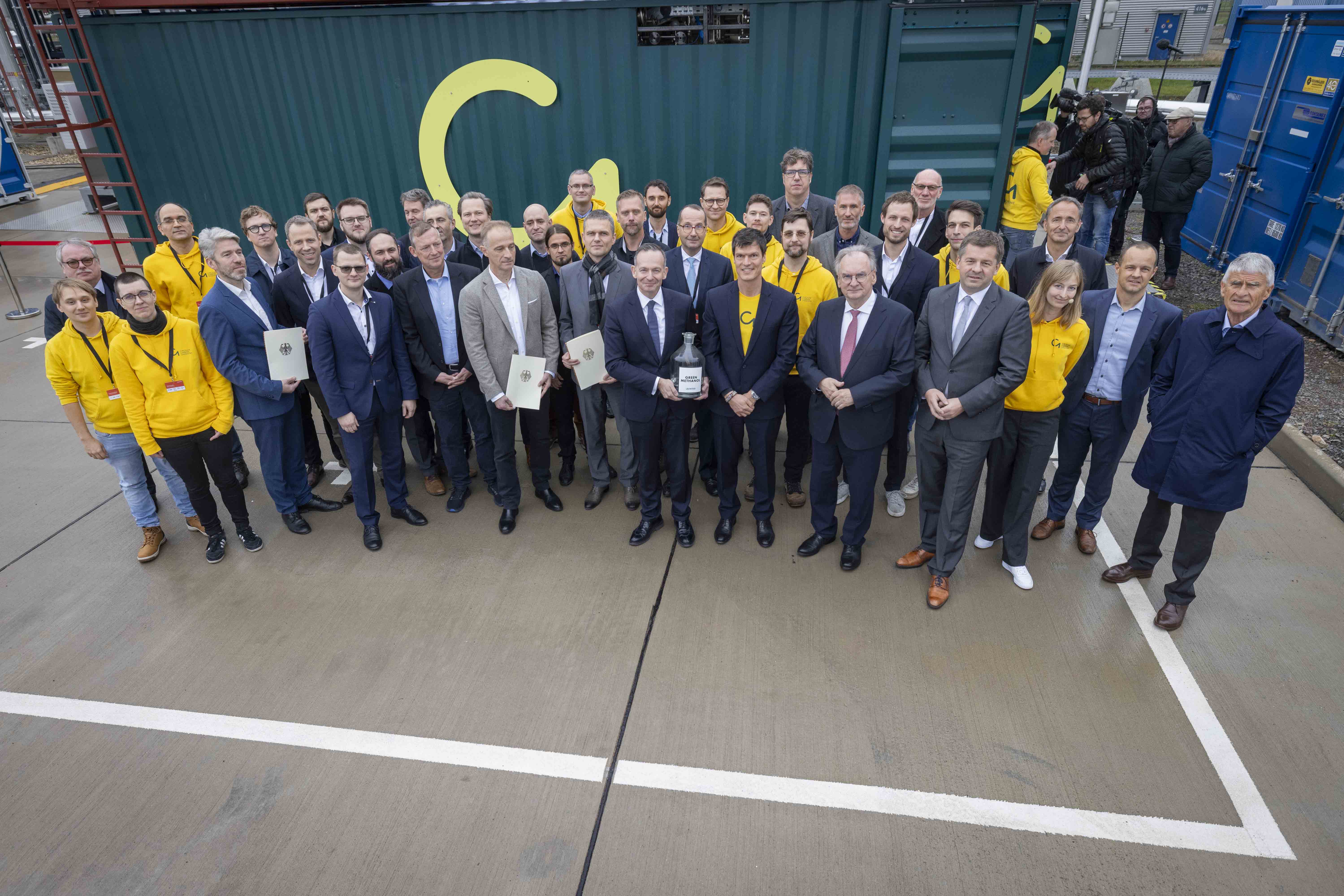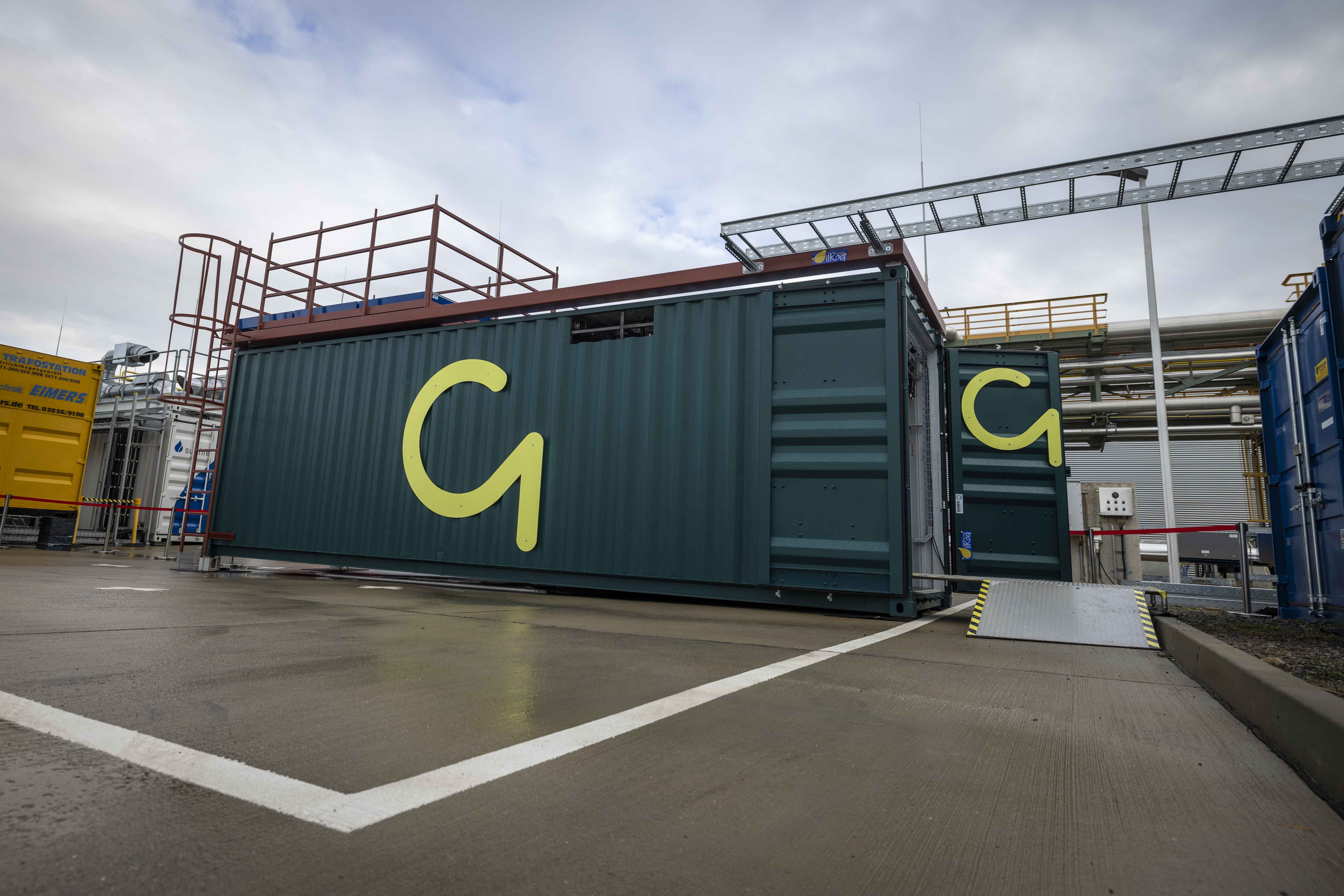Inauguration of the world’s first pilot plant for the cost-efficient production of green methanol
Berlin/Leuna, November 20, 2023 – The world’s first pilot plant for the cost-efficient production of green methanol was inaugurated today in the Leuna Chemical Park as part of the Leuna100 project. Behind it is a research consortium made up of the climate-tech start-up C1 Green Chemicals AG and its partners, Fraunhofer Institute for Wind Energy Systems IWES, Fraunhofer Institute for Environmental, Safety and Energy Technology UMSICHT, DBI – Gastechnologisches Institut gGmbH Freiberg, and the Technical University of Berlin (TU Berlin). The goal is to utilize a fundamentally new production process to enable the cost-efficient market ramp-up of green methanol and thus offer the container shipping industry a climate-neutral alternative fuel.

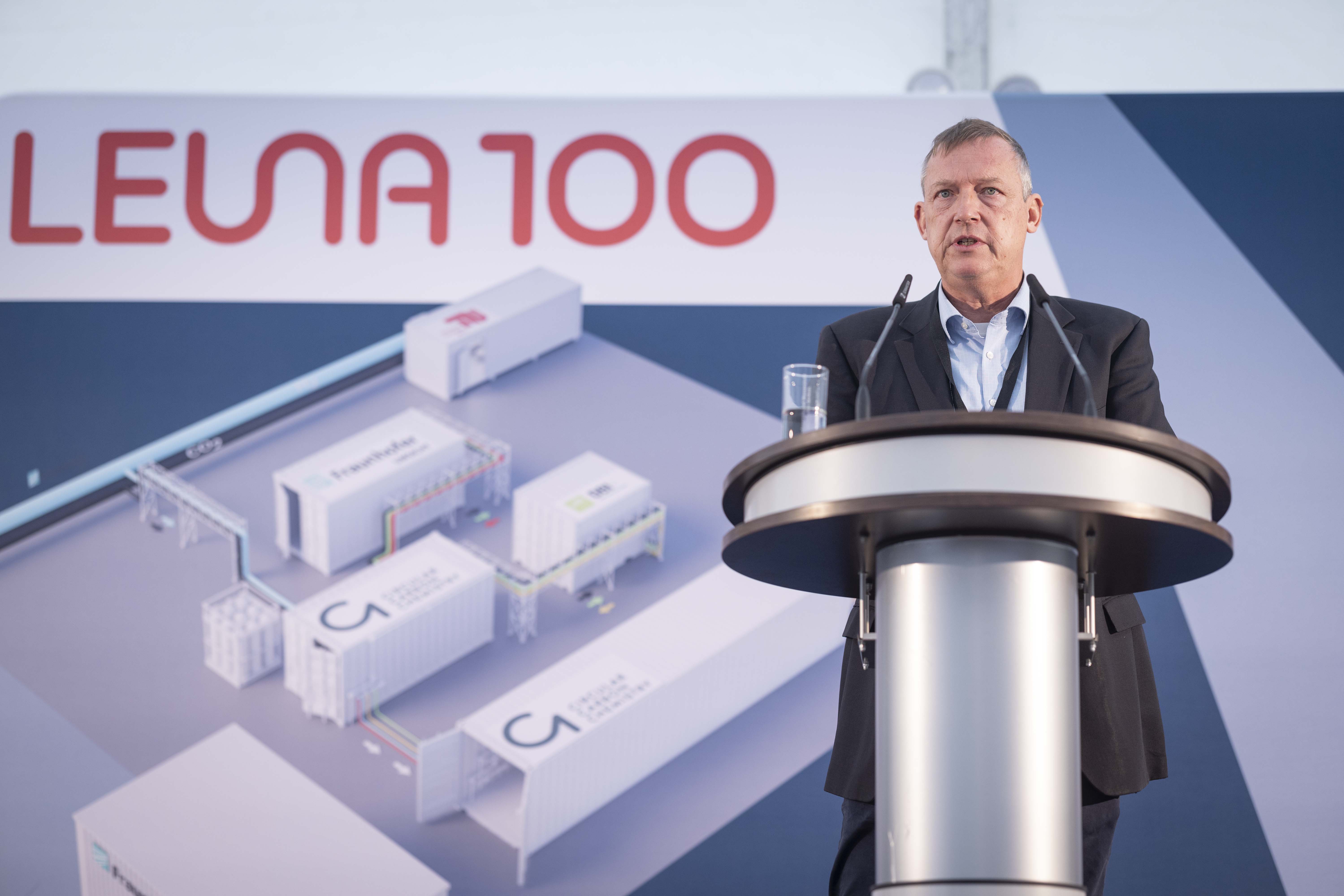
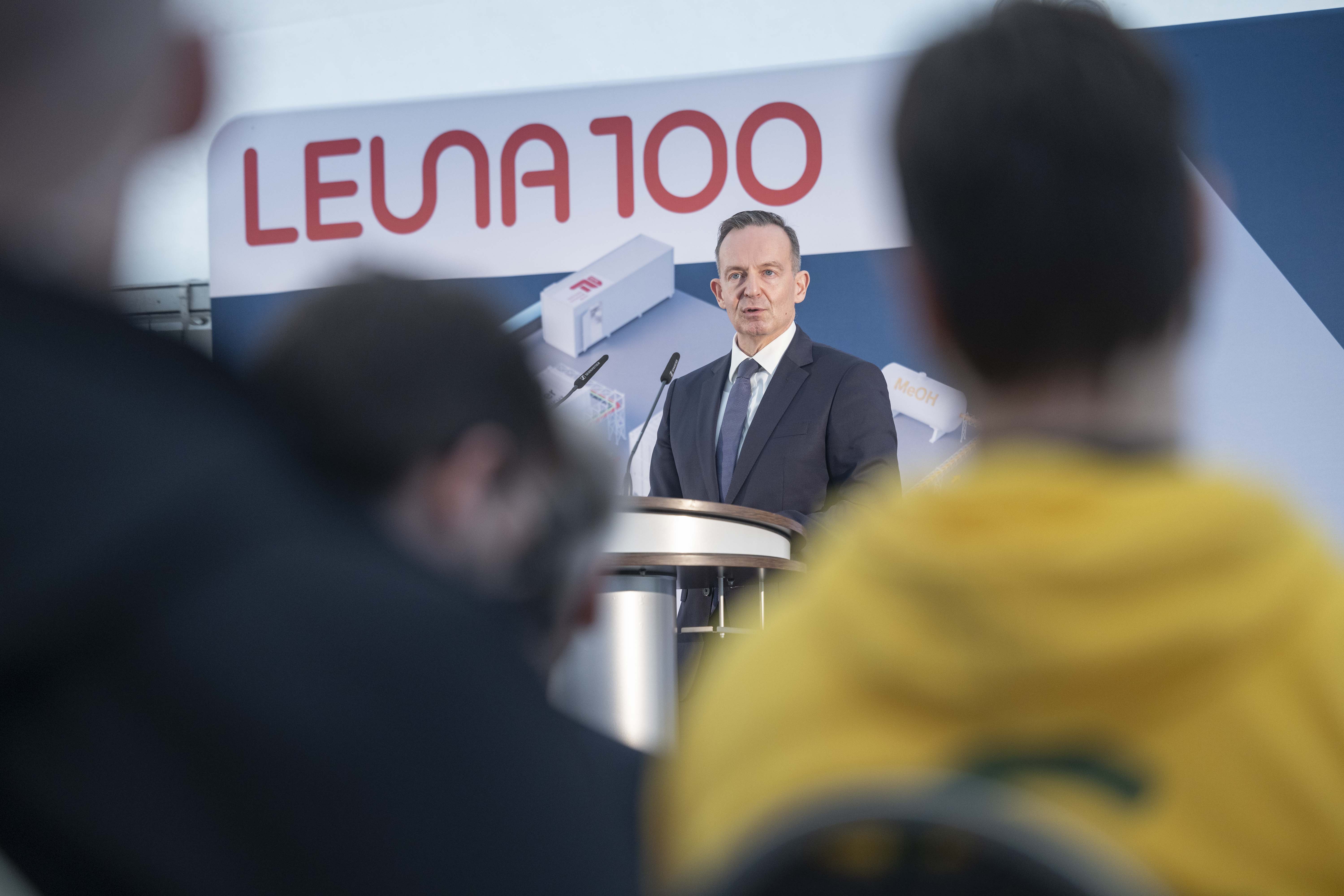
Innovative process for green methanol production
Green methanol production is based on a synthesis gas of carbon monoxide and green hydrogen – hydrogen produced with renewable energy. The process for green methanol production in the Leuna100 project is composed of three steps: synthesis gas production, methanol production, and purification of the crude methanol produced. The innovative technology developed by C1 enables efficient low temperature- and low pressure-based methanol production. The process is made possible by the use of a homogeneous, manganese-based catalysis technology that C1 has developed in cooperation with Leibniz-Institut für Katalyse e. V. (Leibniz Institute for Catalysis). The electricity-based and load-flexible utilization of synthesis gas production and the homogeneous catalysis for the methanol production together form the key innovation.
The pilot plant sees two different technologies coupled for the CO2-based production of synthesis gas: Fraunhofer UMSICHT is providing new, low-temperature co-electrolysis, while DBI – Gastechnologisches Institut gGmbH Freiberg utilizes a reverse water gas shift (RWGS) unit. C1 is delivering the groundbreaking catalyst as well as a reactor developed in-house for the homogeneous catalysis of methanol. Fraunhofer IWES is providing the location and infrastructure at the Hydrogen Lab Leuna and evaluating the load flexibility. TU Berlin is developing an efficient, load-flexible operating concept on the basis of a dynamic overall process model.
Industry history in the Leuna Chemical Park
The project is being funded by the German Federal Ministry for Digital and Transport (BMDV) with a total of €10.4 million over the next three years. Minister for Transport, Dr. Volker Wissing, said at the inauguration: »Industry history is being written today in Leuna. This project represents a milestone for the post-fossil fuel era in the shipping and aviation industries. We are proud to support this ‘made in Germany’ research project with funds from the Renewable Fuels Funding Program. With its funding program, the BMDV is supporting the further development and market ramp-up of renewable fuels and thus also the achievement of climate goals in the transport sector.«
BASF constructed the world’s first methanol plant in Leuna in 1923. Minister President of Saxony-Anhalt, Dr. Reiner Haseloff, emphasized this historical context: »The Leuna chemical complex can look back on over a century of tradition. During this time, it has consciously taken on challenges and proven its innovative strength time and again. The opportunity has now presented itself for Leuna to become the setting for the start of a whole new era. The Leuna100 project is making an important contribution to entering circular chemical production – and not just in Saxony-Anhalt.«
Tankers, container ships, and cruise liners are currently responsible for almost three percent of global annual CO2 emissions. The new climate strategy adopted by the International Maritime Organization in summer 2023 envisages reaching the goal of climate neutrality by around 2050. Emissions should be reduced by at least a fifth compared with 2008 by 2030 and even by at least 70 percent by 2040. Large shipping companies such as Maersk have already ordered methanol-compatible vessels, the first of which are already in use. Renewable fuels based on green hydrogen and CO2 also represent an alternative for the aviation industry. A further processing step involving the alcohol-to-jet (ATJ) process allows the potential production of kerosene from green methanol.
Christian Vollmann, CEO of C1 Green Chemicals AG: »Our innovative process offers the potential to produce green methanol more cost-effectively. We are delighted to have the opportunity to take our technology to the next level in the scope of the pilot plant and take a decisive step towards the market launch.«
Prof. Dr. Andreas Reuter, Managing Director Fraunhofer IWES, said: »With our many years of scientific expertise and a complex research infrastructure for renewable energies, including the Hydrogen Lab Leuna, Fraunhofer IWES is the ideal partner for the successful realization of projects for the production of green fuels for the shipping and aviation industries.«
Background:
The Leuna100 project was launched in the Leuna Chemical Park in August 2023 and is set to run for three years. It is being funded with a total of €10.4 million by the German Federal Ministry for Digital and Transport (BMDV) as part of the Renewable Fuels Funding Program. The funding guideline for the development of renewable fuels is being coordinated by NOW GmbH and implemented by the project management agencies VDI/VDE Innovation + Technik GmbH and Fachagentur Nachwachsende Rohstoffe e. V.
The working group headed by Prof. Dr. Matthias Beller at Leibniz-Institut für Katalyse e. V. (LIKAT), Rostock, is supporting the Leuna100 project as a research partner.
Pictures of the research facility and other material can be found here: Dropbox
Further information: https://www.leuna100.de/
__
Press contact C1
PIABO Communications
Ann-Kathrin Marggraf, Communications Director
leuna100@piabo.net
+49 172 575 6287
Press contact at DBI – Gastechnologisches Institut gGmbH Freiberg
Dipl.-HdL.Emily Schemmel
emily.schemmel@dbi-gruppe.de
+49 3731 4195 339
Press contact at Fraunhofer UMSICHT
Stefanie Bergel
stefanie.bergel@umsicht.fraunhofer.de
+49 208 8598 1599
Press contact at Fraunhofer IWES
Inna Eck
inna.eck@iwes.fraunhofer.de
+49 471 14290-543
Press contact at TU Berlin
Prof. Dr. Jens-Uwe Repke
sekr@dbta.tu-berlin.de
+49 30 314-26900
__
About C1
C1 develops innovative chemical production processes by rethinking them from the atomic level to the production scale. The chemical processes are designed with the help of quantum chemical simulations and implemented as proprietary production technologies. C1 has developed and patented a fundamentally new, homogeneous catalysis process for the production of methanol. The C1 process is significantly more selective, productive, and efficient than the heterogeneous catalysis process employed to date, which dates back to a patent from 1921. The Berlin-based company develops and scales up exclusively on the basis of regenerative raw materials and renewable energies. Right from the first steps in the development of a production process, all processes are designed in such a way as to allow a closed carbon cycle. In this way, C1 is supporting the industry on its journey away from dependence on fossil raw materials such as oil, gas, and coal. Further information: https://www.carbon.one
About DBI – Gastechnologisches Institut gGmbH Freiberg
DBI –Gastechnologisches Institut gGmbH Freiberg is a non-profit organization active in the field of applied research. It is a leader in a variety of projects, especially in the field of the transfer of process engineering processes from laboratory to demonstration scale, and can draw on a wide range of successfully completed and ongoing research projects as well as a broad spectrum of skilled employees. These assets are complemented by expertise in the field of synthesis gas production, with DBI – Gastechnologisches Institut gGmbH Freiberg having a number of test facilities at its disposal for the testing of reaction engineering processes as well as corresponding analysis technology. Further information: https://www.dbi-gruppe.de/
About Fraunhofer UMSICHT
Fraunhofer UMSICHT is paving the way to a sustainable future. With our research in the fields of climate-neutral energy systems, resource-efficient processes, and circular products, we make specific contributions to the achievement of the 17 Sustainable Development Goals of the United Nations. We are developing innovative, industrially feasible technologies, products, and services for the circular economy and putting them into application with all our power. The focus when doing so is on the balance between economically successful, socially just, and environmentally friendly solutions. Further information: https://www.umsicht.fraunhofer.de/en
About Fraunhofer IWES
Fraunhofer IWES secures investments in technological developments through validation, shortens innovation cycles, accelerates certification procedures, and increases planning accuracy by means of innovative measurement methods in the wind energy and hydrogen technology sectors. Further information: https://www.iwes.fraunhofer.de/en
About TU Berlin
The main focus of the work in the Process Dynamics and Operations department at TU Berlin is on the modeling, simulation, and optimization for design and operation of a wide range of process engineering processes. Its research work centers on economic efficiency, energy efficiency, and sustainability. In addition to process systems engineering, fundamental research in the field of fluid dynamics and separation efficiency, as encountered in thermal separation processes, is another key competence. The department is pursuing a wide range of endeavors in the field of intensified processes, where, for example, novel concepts for homogeneous catalysis in innovative, switchable solvent systems (microemulsions) and novel reactor and operating concepts for heterogeneous catalysis are being brought to process maturity. Further information: https://www.tu.berlin/en/dbta
About Leibniz-Institut für Katalyse e. V. (LIKAT)
Over 70 years of catalysis expertise form the basis of Leibniz-Institut für Katalyse e. V. (LIKAT) at the University of Rostock. Originally the only institute dedicated exclusively to catalysis, it is now one of the largest publicly funded research institutes in the field of applied catalysis in Europe. The methodological and material expertise of the more than 300 employees is focused on the development of resource-saving processes. Further information: https://www.catalysis.de/en
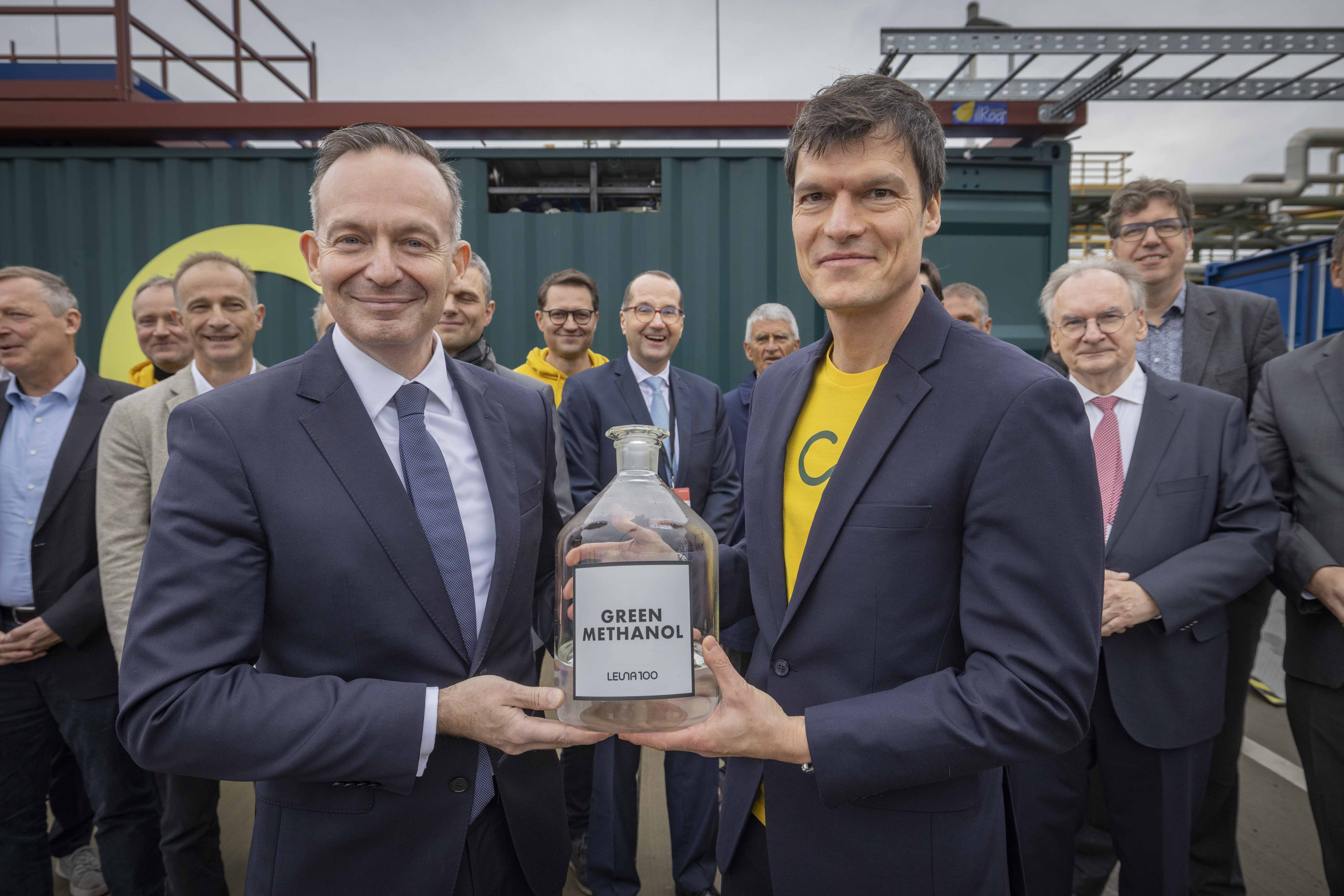


Last modified:
